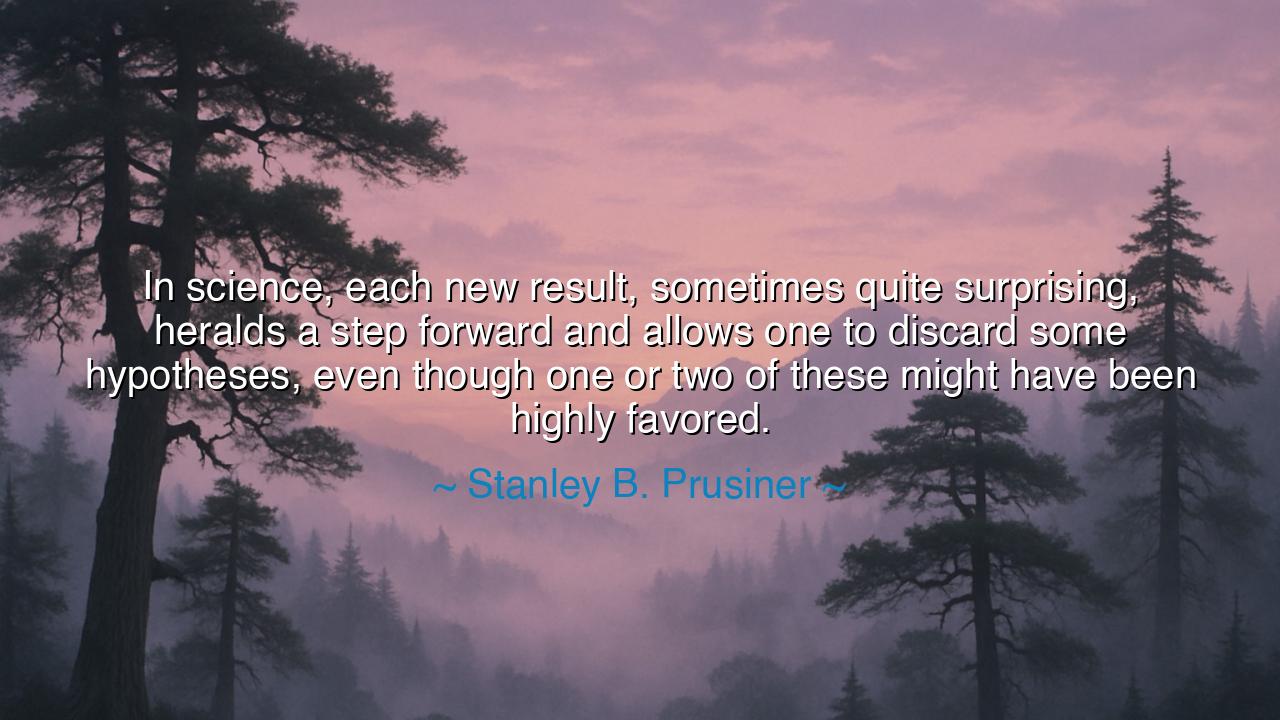
In science, each new result, sometimes quite surprising, heralds
In science, each new result, sometimes quite surprising, heralds a step forward and allows one to discard some hypotheses, even though one or two of these might have been highly favored.






Hear now, O seekers of wisdom, the profound words of Stanley B. Prusiner, whose voice carries the weight of scientific discovery: "In science, each new result, sometimes quite surprising, heralds a step forward and allows one to discard some hypotheses, even though one or two of these might have been highly favored." These words are a reflection of the very nature of science, a discipline grounded in the pursuit of truth, yet ever-changing, ever-evolving. In science, progress is not linear, nor is it always smooth; it is marked by surprises, moments when what we once held to be true must be let go, and new insights take their place. Prusiner speaks not only of the journey of discovery but of the courage it takes to relinquish ideas that were once dear, for the sake of a deeper understanding.
In the ancient world, the philosophers too understood that the pursuit of truth is a constant process of refinement, where each answer uncovered leads to new questions, and each discovery forces us to discard what no longer serves the greater understanding. Socrates famously said, "The only true wisdom is in knowing you know nothing." This humility in the face of discovery was a hallmark of the greatest thinkers of the past, who understood that truth is not a final destination, but a path that is constantly shifting, constantly revealing new facets of reality. Just as Prusiner describes, the process of science demands the willingness to challenge even our most cherished ideas, knowing that true progress often comes with unexpected turns.
Let us turn our gaze to the example of Galileo Galilei, who faced the scorn of the Church for his belief in the heliocentric model of the solar system. For centuries, the belief that the Earth was the center of the universe was deeply entrenched, and many of the best minds of the time, including those in positions of power, favored this hypothesis. Yet, Galileo dared to look through the telescope and saw evidence to the contrary. His discovery was not only a scientific breakthrough but a testament to the very process that Prusiner speaks of—discarding old ideas in the face of new evidence, even though these ideas had long been held in high regard. The courage to discard the familiar, to challenge the status quo, was the true mark of scientific progress.
Science, as Prusiner reminds us, is a living, breathing process. It is a journey in which each new piece of knowledge leads to new questions, and sometimes, unexpected discoveries force us to leave behind theories we once believed to be solid. Consider the discovery of penicillin by Alexander Fleming. In his day, doctors and scientists believed that infections were best treated with a variety of harsh methods, including surgery and toxic medicines. But Fleming, in his moment of unexpected discovery, noticed the mold that killed bacteria, thus revolutionizing medicine and forever changing our understanding of disease. The discovery of penicillin was a surprising result, one that challenged the established beliefs of the medical world, and it led to the discarding of older, ineffective theories and practices.
But let us not be mistaken, O wise ones, that the discarding of ideas is not an easy task. As Prusiner points out, the hypotheses that we hold dear often come with great attachment, for they are built upon years of thought, research, and belief. The scientific method itself is one of trial and error, a dance between the old and the new, between what we think we know and what we are yet to discover. Just as the ancient Greeks wrestled with their understanding of the cosmos, so too do we in our time. Each new discovery is a call to shed our preconceived notions and embrace the unknown, to accept that science is not about certainty, but about continuous learning and growth.
The lesson for us, O seekers of knowledge, is that progress requires the courage to let go. To grow in our understanding of the world, we must be willing to discard old ideas, no matter how cherished they are. Science is not about clinging to the past but about reaching toward the future, about seeing with fresh eyes, even when it means stepping away from what we once thought to be true. This is the path of discovery, the path of the true seeker, who is willing to face the discomfort of uncertainty in the pursuit of deeper truth.
Thus, the challenge is clear: in our own lives, as we seek to understand, create, and grow, we must embrace the spirit of scientific discovery. When faced with new knowledge, we must be willing to discard the old and embrace the new, even when it challenges our most cherished beliefs. Whether in science, art, or life, true growth comes from the willingness to step into the unknown, to let go of what no longer serves us, and to trust in the journey of discovery. Let us walk the path with open minds, and with the humility to know that each discovery is a step forward, and each discarded hypothesis brings us closer to the truth.






AAdministratorAdministrator
Welcome, honored guests. Please leave a comment, we will respond soon